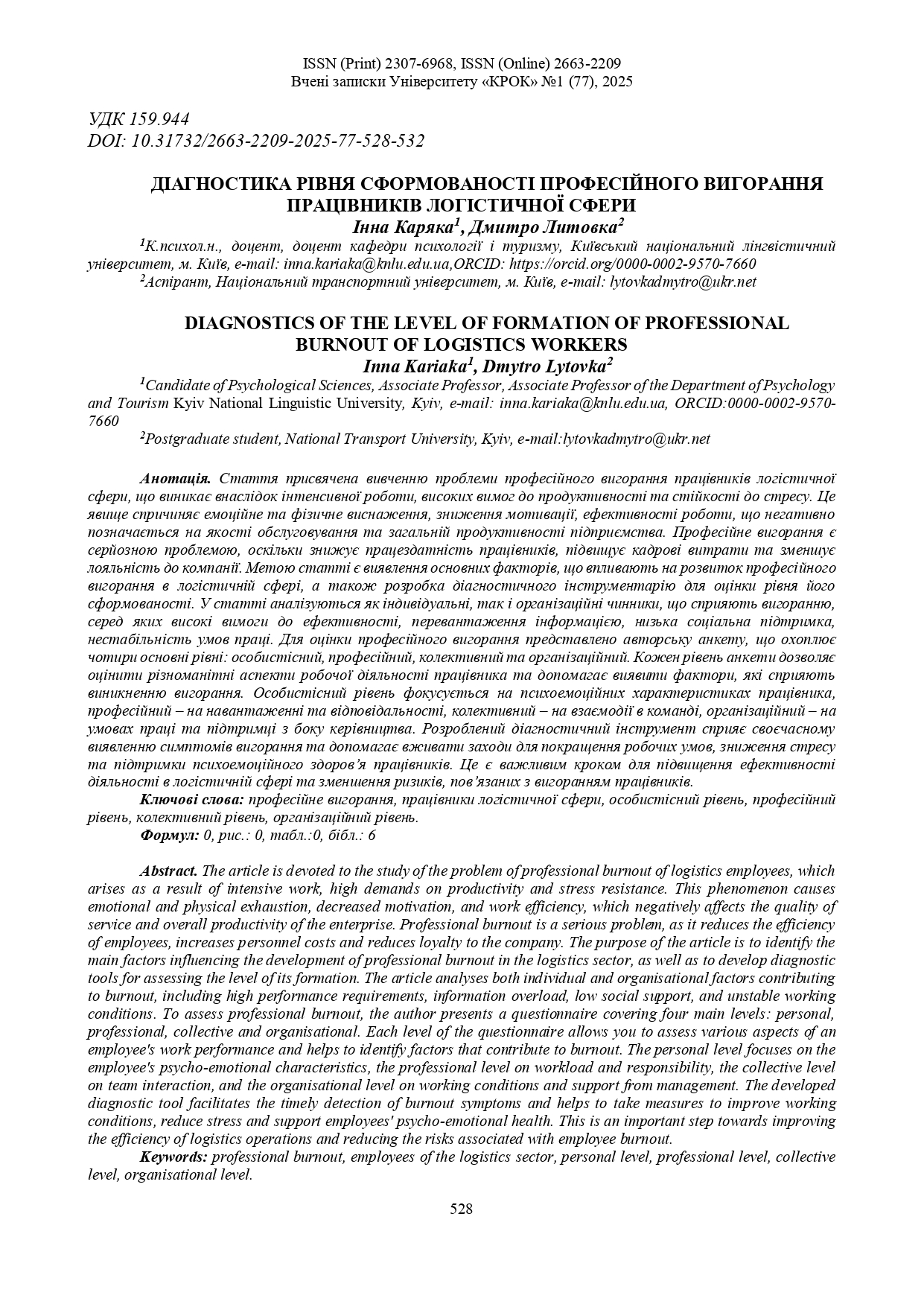DIAGNOSTICS OF THE LEVEL OF FORMATION OF PROFESSIONAL BURNOUT OF LOGISTICS WORKERS
DOI:
https://doi.org/10.31732/2663-2209-2025-77-528-532Keywords:
professional burnout, employees of the logistics sector, , personal level, professional level, collective level, organisational levelAbstract
The article is devoted to the study of the problem of professional burnout of logistics employees, which arises as a result of intensive work, high demands on productivity and stress resistance. This phenomenon causes emotional and physical exhaustion, decreased motivation, and work efficiency, which negatively affects the quality of service and overall productivity of the enterprise. Professional burnout is a serious problem, as it reduces the efficiency of employees, increases personnel costs and reduces loyalty to the company. The purpose of the article is to identify the main factors influencing the development of professional burnout in the logistics sector, as well as to develop diagnostic tools for assessing the level of its formation. The article analyses both individual and organisational factors contributing to burnout, including high performance requirements, information overload, low social support, and unstable working conditions. To assess professional burnout, the author presents a questionnaire covering four main levels: personal, professional, collective and organisational. Each level of the questionnaire allows you to assess various aspects of an employee's work performance and helps to identify factors that contribute to burnout. The personal level focuses on the employee's psycho-emotional characteristics, the professional level on workload and responsibility, the collective level on team interaction, and the organisational level on working conditions and support from management. The developed diagnostic tool facilitates the timely detection of burnout symptoms and helps to take measures to improve working conditions, reduce stress and support employees' psycho-emotional health. This is an important step towards improving the efficiency of logistics operations and reducing the risks associated with employee burnout.
Downloads
References
Бовдир О.С. & Вельдбрехт, О.О. & Самкова О.М. (2021). Психопрофілактика та подолання синдрому емоційного вигоряння. Вчені записки ТНУ імені В.І.Вернадського. Серія: Психологія. Прикладна психологія. Професійна й організаційна психологія. (6). С. 32-38. https://doi.org/10.32838/2709-3093/2021.6/06
Генрі Форд (2015). Моє життя та робота. Наш формат.
Карамушка, Л.М. & Гнускіна, Г.В. (2018). Психологія професійного вигорання підприємців. Логос.
Федоришин Г.М. & Кицмен Н.З. (2020). Соцільно-психологічні чинники професійного вигорання персоналу Державної служби України з надзвичайних ситуацій. Соціально-правові студії. 2 (8). С. 178-185. https://sls-journal.com.ua/web/uploads/pdf/S&LS_2020_Vol.%203,%20No.%202_178-185.pdf
Шандова, Н.В. (2018). Випереджальний аналіз факторів ризику розвитку промислових підприємств. Маркетинг і менеджмент інновацій, (1). С. 317-326.
Maslach C. & Jackson S. (2018). The measurent of experienced burnout. Jornal of occupational behavior, (2), Р. 99-113. https://www.researchgate.net/publication/227634716_The_Measurement_of_Experienced_Burnout

Downloads
Published
How to Cite
Issue
Section
License

This work is licensed under a Creative Commons Attribution-NonCommercial 4.0 International License.

